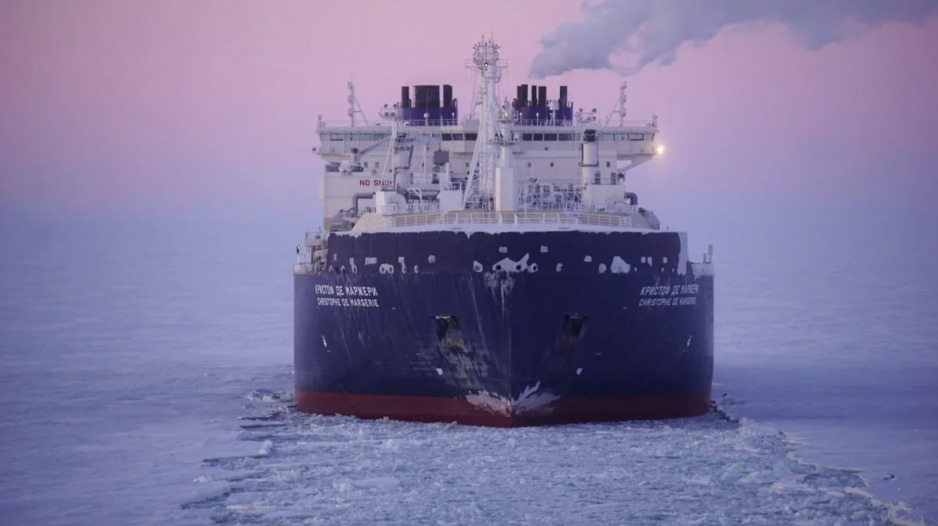On thin ice: The hidden costs of Northern Sea Route shipping

The Northern Sea Route (NSR), which cuts through Arctic waters along Russia’s coast, is not the climate-friendly shipping shortcut Moscow wants people to believe it is, according to a report from The Bellona Foundation, an environmental advocacy group.
Melting sea ice in the Arctic has opened a new path to year-round navigation, an opportunity that Russia has seized upon, moving full steam ahead to capitalize on the economic and geopolitical advantages of alternative shipping routes that can cut the time it now takes to move goods between Europe and Asia.
However, drawing on an evaluation of publicly available information about Russia’s plans for the NSR, the comprehensive report published July 29 issues a stark warning about the environmental and political risks posed by increased shipping activity in the Far North
“It’s a bitter irony: global warming is melting the Arctic’s ice, opening waters that were once impassable to commercial ships,” Bellona said in the report. “But the very forces that make the NSR more accessible are the same ones that jeopardize the region’s unique biodiversity and climate stability.
“Russia’s ambitions to transform this route into a major trade artery — and to ramp up oil and gas extraction along its coastline — risk compounding the climate crisis while leaving Arctic ecosystems and people vulnerable to catastrophic pollution,” it said.
Key Takeaways:
- The myth of the “green” route: Proponents claim the NSR is shorter and better for emissions, but emissions from vessels — especially black carbon — directly into the environmentally sensitive region could accelerate Arctic warming, making climate impacts worse, according to the report.
- Political tool, not just a trade route: Moscow sees the NSR as a geopolitical lever to boost exports, project power, and reshape global shipping routes. Moscow sells it as a cheaper alternative to the Suez Canal, with a rapidly expanding icebreaker fleet enabling year-round navigation.
- Fossil fuels dominate NSR traffic: In 2024 alone, more than 84% of the cargo transported along the NSR was oil and natural gas. Fossil fuel extraction is the engine driving Russia’s Arctic strategy, and the Kremlin shows no sign of slowing down, even amid its ongoing war in Ukraine and mounting international sanctions.
- A dangerous route: Treacherous ice, shallow straits, and extreme weather make the NSR risky, especially in winter. Emergency response infrastructure, including oil-spill response and cleanup, is virtually nonexistent.
- Shadow fleet safety: A growing number of unregulated, poorly maintained oil tankers operate in the Arctic with transponders off and no proper oversight, posing massive environmental risks.
- Fragile Arctic ecosystems: Beyond oil spills, noise pollution, invasive species, and super-pollutants such as black carbon and methane disrupt marine life and threaten rapid acceleration of climate change.
- Russia’s Arctic is poorly protected: Despite spanning half the Arctic Ocean coastline and being home to critical wildlife, Russia’s environmental oversight lags far behind its industrial push.
From rising black carbon emissions to fueling Russia’s war economy, the risks far outweigh the benefits, Bellon said. Instead of chasing commercial potential, the Norway-based NGO argues it is time to shift course. Rather than expanding commercial activity along the NSR, the EU and global players should work toward a restrictive regime that prioritizes the Arctic’s climate and environmental protection, it said.
Should the international community fail to approach the challenges posed by Russia’s NSR ambitions, the Arctic risks becoming “another environmental casualty of unchecked industrial ambition,” the report said.
The Bellona Foundation is an international, independent NGO seeking to combat climate change. The group has been engaged in Arctic matters since its founding in the 1980s.
Mary McAuliffe, formerly a Jerusalem-based correspondent for an international news channel, is a freelance journalist, photographer and filmmaker, covering the most pressing issues facing society for television, digital, and radio.